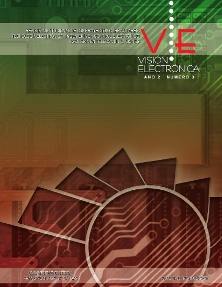DOI:
https://doi.org/10.14483/22484728.18422Published:
2019-03-13Issue:
Vol. 2 No. 1 (2019): Special editionSection:
A Current VisionPrimary user emulation in mobile cognitive radio network: a survey
Emulación de usuario primario en la red de radio cognitiva móvil: estudio
Keywords:
Emulación de usuario primario, Red de Radio Cognitiva, Ataque PUE, Técnicas de detección, Seguridad (es).Keywords:
Primary User Emulation, Cognitive Radio Network, PUE attack, detection techniques, Security (en).Downloads
Abstract (en)
For emerging networks such as the mobile cognitive radio network, it is essential to study their possible attacks and thus generate detection strategies. Generally attacks are focused on only one layer of the OSI model, they have been studied for each layer from the physical level to the application level and have focused on fixed secondary users. In cognitive radio networks, the primary user emulation (PUE) is the most studied attack since it affects the entire cognitive cycle from the physical layer to the upper layers. This paper defines types of PUE attack and countermeasures, analyzing the effects on fixed and mobile secondary users and attackers.
Abstract (es)
En el caso de las redes emergentes, como la red de radiocomunicaciones cognitivas móviles, es esencial estudiar sus posibles ataques y generar así estrategias de detección. Por lo general, los ataques se centran en una sola capa del modelo OSI, se han estudiado para cada capa desde el nivel físico hasta el nivel de aplicación y se han centrado en los usuarios secundarios fijos. En las redes de radiocomunicaciones cognitivas, la emulación de usuario primario (PUE) es el ataque más estudiado, ya que afecta a todo el ciclo cognitivo desde la capa física hasta las capas superiores. En este documento se definen los tipos de ataque PUE y las contramedidas, analizando los efectos en los usuarios secundarios fijos y móviles y en los atacantes.
References
E. C. Muñoz, H. J. E. Blanco, and J. A. F. Calderón, “Gestión del espectro radioeléctrico en Colombia,” Rev. Tecnura, vol. 19, no. 45, pp. 159–174, 2015. https://doi.org/10.14483/udistrital.jour.tecnura.2015.3.a12
J. H. A. Rentería and A. N. Cadavid, “Cognitive radio–State of the Art,” Sist. Telemática, vol. 9, no. 16, pp. 31–53, 2011. https://doi.org/10.18046/syt.v9i16.1028
S. P. T. Force, “Spectrum policy task force report et docket no. 02-135,” US Fed. Commun. Comm., 2002.
L. F. Pedraza Martinez and others, “Modelo de propagación para un entorno urbano que identifica las oportunidades espectrales para redes móviles de radio cognitiva,” Universidad Nacional de Colombia-Sede Bogotá.
C. Hemández, L. Pedraza, I. Páez, and E. Rodriguez-Colina, “Análisis de la Movilidad Espectral en Redes de Radio Cognitiva,” Inf. Tecnológica, vol. 26, no. 6, pp. 169–186, 2015. https://doi.org/10.4067/S0718-07642015000600018
Y. Peng, F. Xiang, H. Long, and J. Peng, “The research of cross-layer architecture design and security for cognitive radio network,” in Information Engineering and Electronic Commerce, 2009. IEEC’09. International Symposium on, 2009, pp. 603–607. https://doi.org/10.1109/IEEC.2009.133
G. Baldini, T. Sturman, A. R. Biswas, R. Leschhorn, G. Godor, and M. Street, “Security aspects in software defined radio and cognitive radio networks: A survey and a way ahead,” IEEE Commun. Surv. Tutor., vol. 14, no. 2, pp. 355–379, 2012. https://doi.org/10.1109/SURV.2011.032511.00097
T. C. Clancy and N. Goergen, “Security in cognitive radio networks: Threats and mitigation,” in Cognitive Radio Oriented Wireless Networks and Communications, 2008. CrownCom 2008. 3rd International Conference on, 2008, pp. 1–8. https://doi.org/10.1109/CROWNCOM.2008.4562534
J. Blesa Martínez, “Cognitive strategies for security in wireless sensor networks,” Telecomunicacion, 2015.
R. K. Sharma and D. B. Rawat, “Advances on security threats and countermeasures for cognitive radio networks: A survey,” IEEE Commun. Surv. Tutor., vol. 17, no. 2, pp. 1023–1043, 2015. https://doi.org/10.1109/COMST.2014.2380998
H. Wen, S. Li, X. Zhu, and L. Zhou, “A framework of the PHY-layer approach to defense against security threats in cognitive radio networks,” IEEE Netw., vol. 27, no. 3, pp. 34–39, 2013. https://doi.org/10.1109/MNET.2013.6523806
T. N. Le, W.-L. Chin, and W.-C. Kao, “Cross-layer design for primary user emulation attacks detection in mobile cognitive radio networks,” IEEE Commun. Lett., vol. 19, no. 5, pp. 799–802, 2015. https://doi.org/10.1109/LCOMM.2015.2399920
J. Mitola, “Software radios: Survey, critical evaluation and future directions,” IEEE Aerosp. Electron. Syst. Mag., vol. 8, no. 4, pp. 25–36, 1993. https://doi.org/10.1109/62.210638
T. Le and C. Bostian, “General radio interface between cognitive algorithms and reconfigurable radio platforms,” in Software Defined Radio Forum Technical Conference, 2007.
A. Attar, H. Tang, A. V. Vasilakos, F. R. Yu, and V. C. Leung, “A survey of security challenges in cognitive radio networks: Solutions and future research directions,” Proc. IEEE, vol. 100, no. 12, pp. 3172–3186, 2012. https://doi.org/10.1109/JPROC.2012.2208211
S. Rizvi, J. Mitchell, and N. Showan, “Analysis of security vulnerabilities and threat assessment in Cognitive Radio (CR) networks,” in Application of Information and Communication Technologies (AICT), 2014 IEEE 8th International Conference on, 2014, pp. 1–6. https://doi.org/10.1109/ICAICT.2014.7035911
J. Sen, “A survey on security and privacy protocols for cognitive wireless sensor networks,” ArXiv Prepr. ArXiv13080682, 2013.
Ö. Cepheli and G. K. Kurt, “Physical layer security in cognitive radio networks: A beamforming approach,” in Communications and Networking (BlackSeaCom), 2013 First International Black Sea Conference on, 2013, pp. 233–237. https://doi.org/10.1109/BlackSeaCom.2013.6623415
K. K. Chauhan and A. K. S. Sanger, “Survey of Security threats and attacks in cognitive radio networks,” in Electronics and Communication Systems (ICECS), 2014 International Conference on, 2014, pp. 1–5. https://doi.org/10.1109/ECS.2014.6892537
L. Jianwu, F. Zebing, F. Zhiyong, and Z. Ping, “A survey of security issues in cognitive radio networks,” China Commun., vol. 12, no. 3, pp. 132–150, 2015. https://doi.org/10.1109/CC.2015.7084371
R. Yu, Y. Zhang, Y. Liu, S. Gjessing, and M. Guizani, “Securing Cognitive Radio Networks against Primary User Emulation Attacks,” IEEE Netw., vol. 30, no. 6, pp. 62–69, 2016. https://doi.org/10.1109/MNET.2016.1200149NM
M. Khasawneh and A. Agarwal, “A survey on security in Cognitive Radio networks,” in Computer Science and Information Technology (CSIT), 2014 6th International Conference on, 2014, pp. 64–70. https://doi.org/10.1109/CSIT.2014.6805980
P. K. Niranjane, V. M. Wadhai, S. H. Rajput, and J. B. Helonde, “Performance analysis of PUE attacker on Dynamic Spectrum access in cognitive radio,” in Pervasive Computing (ICPC), 2015 International Conference on, 2015, pp. 1–6. https://doi.org/10.1109/PERVASIVE.2015.7086985
A. G. Fragkiadakis, E. Z. Tragos, and I. G. Askoxylakis, “A survey on security threats and detection techniques in cognitive radio networks,” IEEE Commun. Surv. Tutor., vol. 15, no. 1, pp. 428–445, 2013. https://doi.org/10.1109/SURV.2011.122211.00162
B. Naqvi, I. Rashid, F. Riaz, and B. Aslam, “Primary user emulation attack and their mitigation strategies: A survey,” in Information Assurance (NCIA), 2013 2nd National Conference on, 2013, pp. 95–100. https://doi.org/10.1109/NCIA.2013.6725331
Y. Yu, L. Hu, H. Li, Y. Zhang, F. Wu, and J. Chu, “The Security of Physical Layer in Cognitive Radio Networks,” J. Commun., vol. 9, no. 12, pp. 916–922, 2014. https://doi.org/10.12720/jcm.9.12.916-922
J. Soto, S. Queiroz, and M. Nogueira, “Taxonomy, flexibility, and open issues on pue attack defenses in cognitive radio networks,” IEEE Wirel. Commun., vol. 20, no. 6, pp. 59–65, 2013. https://doi.org/10.1109/MWC.2013.6704475
M. Ghaznavi and A. Jamshidi, “Defence against Primary User Emulation Attack Using Statistical Properties of the Cognitive Radio Received Power,” IET Commun., 2017. https://doi.org/10.1049/iet-com.2016.1248
How to Cite
APA
ACM
ACS
ABNT
Chicago
Harvard
IEEE
MLA
Turabian
Vancouver
Download Citation
License
Copyright (c) 2019 Visión electrónica

This work is licensed under a Creative Commons Attribution-NonCommercial 4.0 International License.
1.png)
Attribution-NonCommercial 4.0 International






.jpg)





